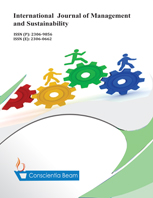Factors affecting talent retention in SMEs in a competitive environment
DOI:
https://doi.org/10.18488/11.v12i4.3539Abstract
The purpose of the study is to investigate the key determinants that influence talent retention within Small and Medium-sized Enterprises (SMEs) operating in a highly competitive world. The study used a quantitative methodology that focuses on gathering numerical data that can be evaluated using an approach called Partial Least Square-Structural Equation Modelling (PLS-SEM). To facilitate data collection, online surveys were made available to respondents in convenient ways to give their opinion at any time and from any location. PLS-SEM was used to examine a set of hypotheses resulting from a theoretical model of turnover intention. According to empirical findings, there was just one factor—work-life balance—that had a substantial impact on employee retention. Two independent variables, self-efficacy and training and development, verified that they do not support the hypothesis and have no significant relationship. Understanding these driving forces holds paramount importance for Small and Medium-sized Enterprises (SMEs) as they endeavor to attract and retain top-tier talent. By adjusting and fine-tuning their policies and operational procedures, SMEs can cultivate an environment conducive not only to the preservation of proficient personnel but also to their growth. Consequently, this study emphasizes the critical importance of customized methodology and the demand for personalized strategies that take into consideration and address the needs of SMEs.

